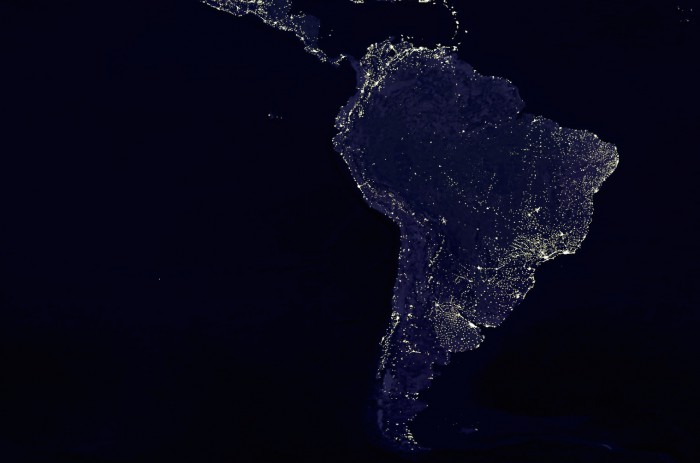
“Connectas is a journalistic platform. The idea, though, is that we don’t just develop traditional media. We are a hybrid model,” said Carlos Eduardo Huertas, the director of Connectas (and a 2012 Nieman Fellow; during his Nieman year Huertas incubated the idea for a platform that would allow journalists to freely exchange information on significant issues common to countries across Latin America and collaborate more easily on reporting projects). “Our focus is producing stories, but within the journalism community we provide support in ways that we can — training, fellowships, every kind of action in the support area — that go toward journalistic production.”
Aprenda a navegar la base de datos de #PanamaPapers con el video de este HangoutCONNECTAS https://t.co/wxDRUPeYGN
— Connectas.org (@ConnectasOrg) May 13, 2016
Since its earliest days in 2013, Connectas has been the partner in a multi-year International Center for Journalists project, the Investigative Reporting Initiative in the Americas, which spans eight countries (funding comes from this initiative). Last year, Connectas and IJFJ created a digital initiative, CONNECTASHub, that brings a bit more structure to journalistic work already being done by Connectas members.
The Hub is made up of more than 140 journalists working in 15 different countries. Connectas has also worked out content distribution agreements with ten different outlets, including Univision and Miami Herald sister paper el Nuevo Herald. Membership is free and any journalist can join the Hub, either by participating in one of its workshops on investigative journalism techniques or by being referred by a Hub member, a partner news organization, or Connectas itself. Members can propose either individual or collective journalism projects, and lean on the Connectas network for reportorial, editorial, and financial assistance. The Hub operates on a “time bank” system intended to reward the most active members: The more time members spend helping the organization, the more benefits they can unlock, such as access to educational activities and more funding opportunities for new projects.Connectas puts out an open call for story proposals and chooses the strongest ideas to develop. The organization provides coaching for a couple of months, offering everything from edits to data analysis support. Its most critical contributions, according to Huertas, are the publication agreements it’s made with other news outlets in the region to help stories spread beyond a single country, and its ability to link up reporters from different countries to investigate common issues.
“Say a member is talking about a mining problem in his or her community. We open this up: This mining company is linked to issues in another reporter’s country — why don’t you work together? We have a transnational network, so if we see something that links Peru, the Dominican Republic, and Mexico, we can have journalist members in each of these countries work together on a story,” Huertas said. “We will also connect a journalist with a good story idea to someone in another country who might have experience in that specific topic to do a kind of mentorship, exchanging experiences, ideas, or even sources.”
Mariana Ladaga joined Connectas in 2013, after participating in an investigative journalism workshop the group conducted in Paraguay, and has produced three stories with support from the network and ICFJ: one about the cost of access to drinking water in Ciudad del Este where she lived, one about local corruption and the public transport system, and most recently, a big investigation into the misuse of agrochemicals and links to disease in Paraguay, which got its own dedicated website and was published in other outlets, including the Colombian El Espectador.
“Connectas encouraged me to keep doing investigative journalism,” she said. “It’s also very important that Connectas allows me to share the knowledge I acquire with other journalists around my country and other countries in Latin America, and worldwide. In Latin America, we have same problems in our countries and we can work together against, for example, acts of corruption or drug trafficking, or weapons trafficking, or smuggling.”
Mexico-based freelance journalist Priscila Hernández, who reports on human rights, gender, migration, and disability issues, has also been involved with Connectas for several years.
“It was from participating in Connectas that I realized I had to cover these issues not only with stories, but also with data, statistics, and documents,” she said. “Before joining Connectas, I saw these issues with little idea of connecting them to issues in other countries beyond Mexico. This initiative helped me realize that in addition to issues around migration, drug trafficking and money laundering networks have all tended to cross borders, and journalists must work to be connected and linked beyond the places where we live.”
She pointed to one collaborative piece she worked on with journalists from Mexico and El Salvador about migrants who lose limbs after falling off trains trying to leave their countries. The team requested documents from the International Committee of the Red Cross and the Mexican Government and was able to secure additional funding sources to conduct the research. The story was published on SinEmbargo in Mexico, through El Mundo in El Salvador, as well as in El Espectador.
“Our stories spread throughout the continent,” Huertas said. “We are trying to break censorship barriers that exist in the Americas. Some topics have trouble spreading in local countries because nobody wants to talk about those issues. One media outlet might publish something, but maybe nobody else wants to continue that investigation at other media outlets. Connectas is breaking out of that.”